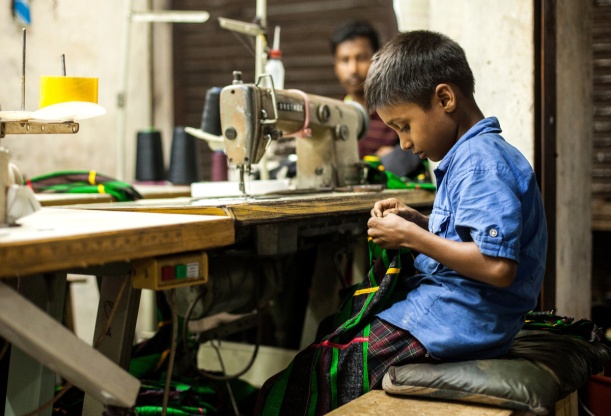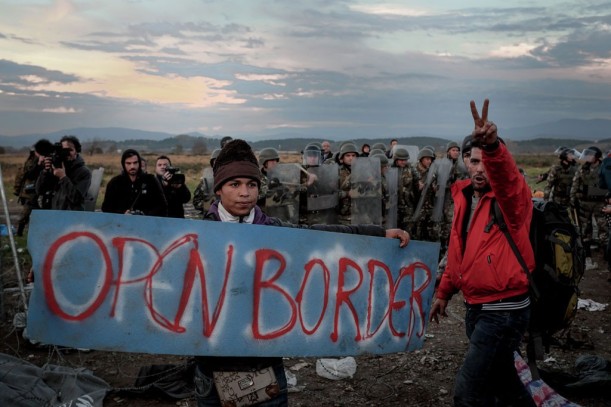Alison Aminzadeh
When one thinks of a state currently in turmoil, The Republic of Ireland is not usually the first to come to mind. However, the country has faced intense criticism directed at its criminalization of abortion.[1] Is the state suffering from collective cognitive dissonance? It has been lauded for becoming the first country to legalize marriage equality by popular vote, after only decriminalizing homosexuality almost twenty years ago.[2] Many point to this quick turnaround as evidence of the state’s increasingly progressive politics and that Ireland is an “inclusive and tolerant nation.”[3] At the same time that the Irish voters made this historic decision, women and girls still did not have access to safe and legal abortions.[4] The absence of this right is evidence that Ireland is neither a progressive paradise nor an intolerant wasteland; despite the many ways the country has overcome its history of discrimination, half its population does not have access to the reproductive health services that are a hallmark of equality in developed nations.[5]
Abortion is sometimes considered a right under international law,[6] but women and girls in Ireland can only obtain one if the pregnancy endangers the life of the woman.[7] According to the Irish Family Planning Agency, this also includes suicide, as this would qualify as a serious threat to the mother’s life. The Protection of Life During Pregnancy Act of 2013 provides for this exception.[8] After much deliberation about the suicide exception, the PLDPA was constructed to require two psychiatrists and one obstetrician to ensure that the test (based in the constitution) is met: (1) there is a real and substantial risk that the woman will die from suicide, (2) in the reasonable opinion of the psychiatrists and the obstetrician, terminating the pregnancy is the only way to avert this risk, and (3) in arriving at that opinion, the doctors have held in regard the need to preserve the life of the unborn as far as practicable.[9] Besides Andorra, Malta, and San Marino, Ireland is the only country in Europe that bans abortion, even in instances of rape, incest, and fetal impairment.[10] Amnesty International launched a campaign to encourage Ireland to – at the very least – allow abortions in these exceptional cases.[11] The draconian law, Ireland’s Regulation of Information Act, also criminalizes doctors and counselors who provide patients with information on abortion, including the process for safely obtaining an abortion.[12]
Organizations such as the Irish Family Planning Agency work to provide this information to patients anyway. While it is illegal to counsel women seeking abortions over the telephone, they are permitted to have face-to-face interactions abroad.[13] As is the case in the United States, there are also pregnancy crisis centers that imply they can provide abortions; in reality, however, these locations discourage them through misinformation and intimidation tactics.[14] Despite the many obstacles women seeking abortions face, they have the right to request and receive counseling and other information on abortion services in other states, travel to another state for a safe and legal abortion, and be treated with dignity and respect.[15] Many of these women seek abortions in Britain, where it is legal up to 24 weeks.[16] After returning to Ireland, however, these women also have the right to free post-abortion counseling and medical check-ups in Ireland. Notably, Ireland funds these services.[17]


Amnesty International published a report based on the Universal Declaration of Human Rights, titled She is Not a Criminal: The Impact of Ireland’s Abortion Law.[18] The report addressed a wide range of topics that address the repercussions of this law, including stigma, suicidal intent and early delivery, and censorship regarding patient counseling.[19] The report also specifically addresses several facets of international law. For example, the report specifically states that there is an international human rights obligation to address gender stereotypes. It argues that a slew of restrictive laws – Eighth Amendment (1983), Article 40.3.3 of the Irish Constitution, Bunreacht na hEíreann, and the PLDPA of 2013 – reinforce a deep-rooted desire to control the sexuality of females.[20] The report also makes a persuasive argument that Ireland has “outsourced” its human rights obligations; in other words, these restrictive laws have forced women and girls to leave the country in order to find what they are entitled to under international law.[21] This is especially true for the most vulnerable populations of women: the poverty-stricken, the ill, migrants, and asylum seekers.[22] Irish women and girls may have a constitutional right to travel abroad to seek safe and legal abortions, but the right is inaccessible to these vulnerable groups.[23]
For the reasons stated, the Irish government should amend the PLDPA and Ireland’s Regulation of Information Act to reflect greater access to reproductive rights, especially safe and legal abortion. Only sixty-eight other countries around the world subject women and girls to such restrictive abortion laws (entire bans, or bans with the exception of saving the life of the mother).[24] Twenty-six percent of the world is subjected to these draconian laws. However, most of these sixty-eight countries are outside of Europe and North America.[25] Compared to those states to which it is most culturally similar, Ireland’s abortion laws are unreasonably restrictive and run contrary to the spirit of international human rights.
Alison Aminzadeh is a third year law student at the University of Baltimore. She is currently a Rule 16 attorney working on the Human Trafficking Project as a part of the Civil Advocacy Clinic. She is also a Senior Staff Editor for the Journal of International Law, and the former President of the Students Supporting the Women’s Law Center.
[1] Abortion & Irish Law, Irish Family Planning Association (last visited Mar. 28, 2016), available at https://www.ifpa.ie/Pregnancy-Counselling/Abortion-Irish-Law.
[2] Kaitlyn Denzler, Marriage Equality but Not Reproductive Rights: Ireland’s Inconsistency on Human Rights, Amnesty International (Jun. 9, 2015), available at http://blog.amnestyusa.org/europe/marriage-equality-but-not-reproductive-rights-irelands-inconsistency-on-human-rights/.
[3] Id.
[4] Id.
[5] Population – female (% in total) of Ireland, Trading Economics (last visited Mar. 28, 2016) available at http://www.tradingeconomics.com/ireland/population-female-percent-of-total-wb-data.html.
[6] Abortion remains a controversial issue and there is disagreement about whether there is an international right to it. However, it is argued that many sources of international law imply the right. For example, the ICESCR states that women are guaranteed the right to the “highest attainable standard of physical and mental health.” Safe and Legal Abortion is a Woman’s Right, Center for Reproductive Justice 2 (Oct. 2011), available at http://www.reproductiverights.org/sites/crr.civicactions.net/files/documents/pub_fac_safeab_10.11.pdf, citing International Covenant on Economic, Social and Cultural Rights, adopted Dec. 16, 1966, art. 12 G.A. Res. 2200A (XXI), U.N. GAOR, Supp. No. 16, U.N. Doc. A/6316 (1966) (entered into force Jan. 3, 1976), [hereinafter ICESCR]; Amnesty International, supra note 2. Furthermore, in 2010, the European Court of Human Rights heard A, B, & C. v. Ireland. While the court did not decide on the substance of the Ireland’s restrictive abortion laws, it did hold that – under international human rights – women were entitled to a clear process that would let them know whether the Irish law would allow them to legally have an abortion. Heike Felzmann, Challenging Public Deliberation: abortion and suicidality in the Protection of Life During Pregnancy Act of 2013, Nat’l Univ. of Ireland Galway 3 (Eds. Allyn Fives & Keith Breen, last visited Mar. 28, 2016), available at http://www.academia.edu/13878703/Challenging_public_deliberation_abortion_and_suicidality_in_the_Protection_of_Life_During_Pregnancy_Act_2013; http://www.echr.coe.int/Documents/FS_Reproductive_ENG.pdf.
7 Irish Family Planning Association, supra note 1.
8 About Us, Irish Family Planning Association (last visited Mar. 28, 2016), available at https://www.ifpa.ie/about_us.
[7] Id.
[8] Irish Family Planning Association, supra note 1.https://www.ifpa.ie/Pregnancy-Counselling/Abortion-Irish-Law. The 8th Constitutional Amendment to the Irish Constitution – Article 40.3.3 – guarantees the right to life to the unborn. Attorney General v. X (“the X case”) made the vague law more specific, forbidding abortion even if cases of rape; however, the 1992 case held that being suicidal was an exception. The inclusion of the suicide exception in the Protection of Life During Pregnancy Act of 2013 was highly contested for several reasons, one of which was the argument that allowing this exception would cause the “floodgates” to open. Incidentally, whether a woman is suicidal from pre-existing mental health conditions or directly as a result of her pregnancy needs not be distinguished. Felzmann, supra note 5, at 2-3.
[9] Felzmann, supra note 5, at 9, citing Implementation of the Protection of Life During Pregnancy Act of 2013: Guidance Document for Health Professions, Dep’t of Health, Ireland (2014), available at http://health.gov.ie/wp-content/uploads/2014/09/Guidance-Document-Final-September-2014.pdf.
[10] Denzler, supra note 2.
[11] Id.
[12] Id.
[13] Irish Family Planning Association, supra note 1.
[14] Id.
[15] Id.
[16] Abortion is legal in Britain up to twenty-four weeks, subject to some conditions. Id.
[17] Id.
[18] See generally She is not a Criminal: The Impact of Ireland’s Abortion Law, Amnesty International (2015), available at http://www.amnestyusa.org/sites/default/files/she_is_not_a_criminal_-_embargoed_09_june.pdfs.
[19] Id. at 17, 27-28.
[20] Id. at 13.
[21] Ireland: Government Must Accept UN Call for Constitutional Referendum on Abortion, Amnesty International (Jun. 22, 2015), available at http://www.amnestyusa.org/news/press-releases/ireland-government-must-accept-un-call-for-constitutional-referendum-on-abortion.
[22] Amnesty International, supra note 18, at 24.
[23] See generally Id.
[24] Felzmann, supra note 5, at 4, citing R. Boland & L. Katzive, Developments in Laws on Induced Abortion: 1998-2007, International Family Planning Perspectives 110-20 (2008).
[25] Id.




























